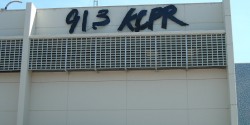Last month we reported that KCPR-FM, the college radio station at California Polytechnic University, San Luis Obispo was changing focus to become a more student-oriented station under the oversight of the journalism department. The station, which is nearing its 50th anniversary, recently said goodbye to some long-time non-student DJs, including a jazz show host (and Cal Poly lecturer) who had been on the air for 18 years and an alum who had been at the station ever since he started as a student 28 years ago.
A cover story in the New Times SLO goes into tremendous detail about the state of the station and provides some speculation about why these changes are taking place. In addition to the elimination of non-student DJs (which includes alumni DJs, faculty DJs, and community DJs), changes at KCPR also include a required course for radio participants as well as the end of live DJs during late night hours from midnight to 5am. During those graveyard hours pre-recorded shows will now air.
In recent years KCPR has operated without much oversight from the school, functioning more like a student club than the arm of an academic department. Along with that, KCPR has been a champion of freeform programming and independent music (see my 2008 field trip report). There are hints that the programming could change. KCPR’s new General Manager Steven Pardo told the New Times, “I think it’s actually a really positive direction for us…The one thing that [the department] wants is for us to be a little bit more professional in how we do our shows.” Along with that he said that he’d like to see KCPR play “music that can kind of score your day as a radio station where it reflects your mood that you might be in.”
As far as what prompted these changes, the big factors seem to be the arrival of a new journalism department chair in 2012 and a racy unauthorized station fundraiser in 2014, which led to a university Dean threatening to sell the KCPR license. As a result of that conversation, an advisory group convened and was charged with plotting the station’s future. This “KCPR Evolution Core Committee” came up with the recommended changes that are now being instituted. According to the New Times,
A year-long, department-led inquiry considering what to do with the radio station lead up to the June announcement. The process was the result of increased scrutiny over a growing gap between what the station was and what the journalism department, which oversaw the station and owned its operating license with the Federal Communications Commission (FCC), wanted it to be.
As for what precipitated the inquiry, accounts vary. Some people familiar with the station’s internal dynamics point to a series of events and conflicting philosophies that strained the relationship between students, student managers, and the journalism department. Others say that eventually KCPR was destined to follow suit with a changing journalism department and student media landscape.
Bottom line, however, was that the station’s current form and the journalism department’s vision for it were in discord. KCPR was heading into an existential crisis.
For years, KCPR just functioned on its own, with little oversight from the department. It was a heavily music-driven bastion ‘for music nerds, by music nerds,’ as one former DJ choosing to go by her on-air name Biba Pickles, described it.
The heavy emphasis on a student-run, music-centered organization meant mixed results and mixed programming. The station’s quest to bring new, eclectic music meant a range of sounds that might include Dylan, The Pixies, MF Doom, Igor Stravinsky, or John Coltrane at the base, and extend to more out-of-the-box artists that deliver something much different than what you’ve ever heard on, or off, the radio.
Tune into KCPR and you might encounter anything from indy rock, underground hip-hop, contemporary classical, and avant-garde jazz to stuff that’s even more on the fringes, like scream metal, no-fi, anti-folk, and dream-pop.
As for the on-air DJs, their radio presence and fluency of the equipment greatly varied between professional quality and five-minutes of rambling nonsense between songs.”
Currently the KCPR website redirects to a Mustang News site (the student news service at Cal Poly) that reads “MN coming soon,” so it looks like even more changes are on the way. It will be interesting to see how the station evolves, particularly after the fall semester begins and the campus is packed with students. I’m hoping that KCPR will still maintain its independent ethos, which has spawned creative personalities and shows over the years, including former KCPR DJ and musician Weird Al Yankovic (whose parody of “My Sharona” was recorded across the hall from the station).



